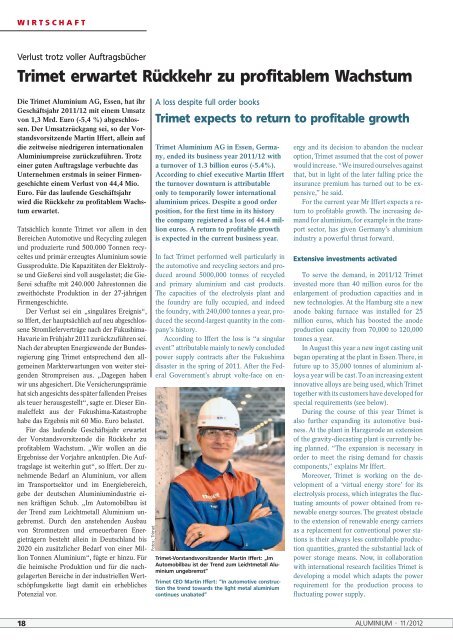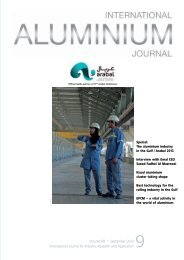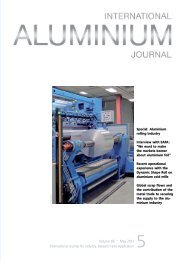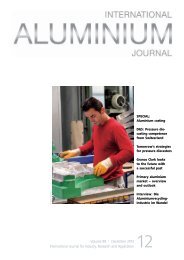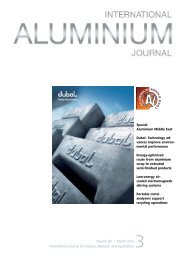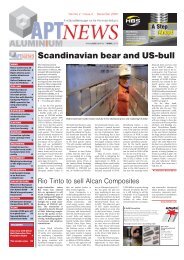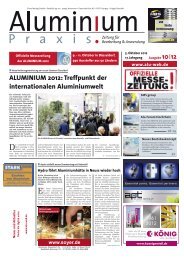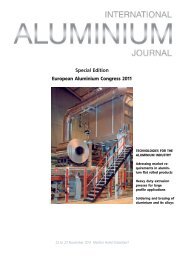special - ALUMINIUM-Nachrichten – ALU-WEB.DE
special - ALUMINIUM-Nachrichten – ALU-WEB.DE
special - ALUMINIUM-Nachrichten – ALU-WEB.DE
You also want an ePaper? Increase the reach of your titles
YUMPU automatically turns print PDFs into web optimized ePapers that Google loves.
WIRTSCHAFT<br />
Verlust trotz voller Auftragsbücher<br />
Trimet erwartet Rückkehr zu profitablem Wachstum<br />
Die Trimet Aluminium AG, Essen, hat ihr<br />
Geschäftsjahr 2011/12 mit einem Umsatz<br />
von 1,3 Mrd. Euro (-5,4 %) abgeschlossen.<br />
Der Umsatzrückgang sei, so der Vorstandsvorsitzende<br />
Martin Iffert, allein auf<br />
die zeitweise niedrigeren internationalen<br />
Aluminiumpreise zurückzuführen. Trotz<br />
einer guten Auftragslage verbuchte das<br />
Unternehmen erstmals in seiner Firmengeschichte<br />
einem Verlust von 44,4 Mio.<br />
Euro. Für das laufende Geschäftsjahr<br />
wird die Rückkehr zu profitablem Wachstum<br />
erwartet.<br />
Tatsächlich konnte Trimet vor allem in den<br />
Bereichen Automotive und Recycling zulegen<br />
und produzierte rund 500.000 Tonnen recyceltes<br />
und primär erzeugtes Aluminium sowie<br />
Gussprodukte. Die Kapazitäten der Elektrolyse<br />
und Gießerei sind voll ausgelastet; die Gießerei<br />
schaffte mit 240.000 Jahrestonnen die<br />
zweithöchste Produktion in der 27-jährigen<br />
Firmengeschichte.<br />
Der Verlust sei ein „singuläres Ereignis“,<br />
so Iffert, der hauptsächlich auf neu abgeschlossene<br />
Stromlieferverträge nach der Fukushima-<br />
Havarie im Frühjahr 2011 zurückzuführen sei.<br />
Nach der abrupten Energiewende der Bundesregierung<br />
ging Trimet entsprechend den allgemeinen<br />
Markterwartungen von weiter steigenden<br />
Strompreisen aus. „Dagegen haben<br />
wir uns abgesichert. Die Versicherungsprämie<br />
hat sich angesichts des später fallenden Preises<br />
als teuer herausgestellt“, sagte er. Dieser Einmaleffekt<br />
aus der Fukushima-Katastrophe<br />
habe das Ergebnis mit 60 Mio. Euro belastet.<br />
Für das laufende Geschäftsjahr erwartet<br />
der Vorstandsvorsitzende die Rückkehr zu<br />
profitablem Wachstum. „Wir wollen an die<br />
Ergebnisse der Vorjahre anknüpfen. Die Auftragslage<br />
ist weiterhin gut“, so Iffert. Der zunehmende<br />
Bedarf an Aluminium, vor allem<br />
im Transportsektor und im Energiebereich,<br />
gebe der deutschen Aluminiumindustrie einen<br />
kräftigen Schub. „Im Automobilbau ist<br />
der Trend zum Leichtmetall Aluminium ungebremst.<br />
Durch den anstehenden Ausbau<br />
von Stromnetzen und erneuerbaren Energieträgern<br />
besteht allein in Deutschland bis<br />
2020 ein zusätzlicher Bedarf von einer Million<br />
Tonnen Aluminium“, fügte er hinzu. Für<br />
die heimische Produktion und für die nachgelagerten<br />
Bereiche in der industriellen Wertschöpfungskette<br />
liegt damit ein erhebliches<br />
Potenzial vor.<br />
Fotos: Trimet<br />
A loss despite full order books<br />
Trimet expects to return to profitable growth<br />
Trimet Aluminium AG in Essen, Germany,<br />
ended its business year 2011/12 with<br />
a turnover of 1.3 billion euros (-5.4%).<br />
According to chief executive Martin Iffert<br />
the turnover downturn is attributable<br />
only to temporarily lower international<br />
aluminium prices. Despite a good order<br />
position, for the first time in its history<br />
the company registered a loss of 44.4 million<br />
euros. A return to profitable growth<br />
is expected in the current business year.<br />
Trimet-Vorstandsvorsitzender Martin Iffert: „Im<br />
Automobilbau ist der Trend zum Leichtmetall Aluminium<br />
ungebremst“<br />
Trimet CEO Martin Iffert: “In automotive construction<br />
the trend towards the light metal aluminium<br />
continues unabated”<br />
In fact Trimet performed well particularly in<br />
the automotive and recycling sectors and produced<br />
around 5000,000 tonnes of recycled<br />
and primary aluminium and cast products.<br />
The capacities of the electrolysis plant and<br />
the foundry are fully occupied, and indeed<br />
the foundry, with 240,000 tonnes a year, produced<br />
the second-largest quantity in the company’s<br />
history.<br />
According to Iffert the loss is “a singular<br />
event” attributable mainly to newly concluded<br />
power supply contracts after the Fukushima<br />
disaster in the spring of 2011. After the Federal<br />
Government’s abrupt volte-face on energy<br />
and its decision to abandon the nuclear<br />
option, Trimet assumed that the cost of power<br />
would increase. “We insured ourselves against<br />
that, but in light of the later falling price the<br />
insurance premium has turned out to be expensive,”<br />
he said.<br />
For the current year Mr Iffert expects a return<br />
to profitable growth. The increasing demand<br />
for aluminium, for example in the transport<br />
sector, has given Germany’s aluminium<br />
industry a powerful thrust forward.<br />
Extensive investments activated<br />
To serve the demand, in 2011/12 Trimet<br />
invested more than 40 million euros for the<br />
enlargement of production capacities and in<br />
new technologies. At the Hamburg site a new<br />
anode baking furnace was installed for 25<br />
million euros, which has boosted the anode<br />
production capacity from 70,000 to 120,000<br />
tonnes a year.<br />
In August this year a new ingot casting unit<br />
began operating at the plant in Essen. There, in<br />
future up to 35,000 tonnes of aluminium alloys<br />
a year will be cast. To an increasing extent<br />
innovative alloys are being used, which Trimet<br />
together with its customers have developed for<br />
<strong>special</strong> requirements (see below).<br />
During the course of this year Trimet is<br />
also further expanding its automotive business.<br />
At the plant in Harzgerode an extension<br />
of the gravity-diecasting plant is currently being<br />
planned. “The expansion is necessary in<br />
order to meet the rising demand for chassis<br />
components,” explains Mr Iffert.<br />
Moreover, Trimet is working on the development<br />
of a ‘virtual energy store’ for its<br />
electrolysis process, which integrates the fluctuating<br />
amounts of power obtained from renewable<br />
energy sources. The greatest obstacle<br />
to the extension of renewable energy carriers<br />
as a replacement for conventional power stations<br />
is their always less controllable production<br />
quantities, granted the substantial lack of<br />
power storage means. Now, in collaboration<br />
with international research facilities Trimet is<br />
developing a model which adapts the power<br />
requirement for the production process to<br />
fluctuating power supply.<br />
18 <strong><strong>ALU</strong>MINIUM</strong> · 11/2012


